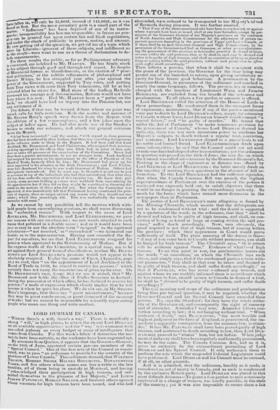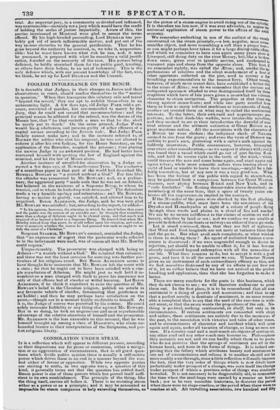LORD DURHAM IN CANADA.
"WHERE there's a will, there's a way." There is manifestly a strong " will," in high places, to attack the ale.ent Lord Duen AM on all available opportunities : and the " way " is to comment with
h one-sided jealousy on every budget or scrap of intelligence that comes from Canada. For this week's fabric of detraction the ma- terials have been suitable, as the workmen have been eagerand apt.
By accounts from Quebec, it appears that the Governor-General, on the 28th of June, appointed certain persons members of the " Special Council." One of the first acts of the Council so consti- tuted, was to pass " an ordinance to provide fur the security of the province of' Lower Canada." This ordinance decreed, that WOLFRED
NELSON, ROBERT SHORE MILNES BOUCHETTE, BONAVENTURE
Vane, and five others whose names are less notable in the late troubles, all of them being in custody at Montreal, and having
acknowledged their participation in high treason, and sub- mitted themselves to the pleasure of her Majesty," and Louis JOSEPH PAPINEAU, ROBERT N sso re, and fourteen others against Whom warrants for high treason have been issued, and who had absconded, were ordered to be transported to her Majssty's island of Bermuda during pleasure. It was further enacted, t "That if any of the above-mentioned who have been so condemned, or against whom warrants have been so issued, shall at any time hereafter, escept by per- mission of the Governor-General of her Majesty's provinces on the continent of North America and High Commissioner for the adjustment of certain im- portant questions depending in the provinces of Upper and Lo v .r Canada, or if there shall be no such Governor-General and High Connor-ioner, by the permission of the Governor-in-Chief, or Governor, or other in administer- ing the government of this province as hereinafter provided, he fond at large, or come within the said province, they or he shall in such case he deemed and taken to be guilty of high treason, and shall on conviction if Won so found at large or coming within the said province, without such permi :sloe as afore- said, suffer death accordingly." Then follows a proviso, that when it shall be cansistent with the peace of the province, the Governor for the time being may permit any of the banished to return, upon giving satisfactory se- curity for their future good behaviour. A proclamation by the Governor-General, in pursuance of the ordinance and couched in nearly the same language, follows. The persons, tea in number, charged with the murders of Lieutenant WEIR and JOSEPH BERTRAND, are excluded from the benefit of the ordinance and proclamation. To all others a free pardon or amnesty is offered. Lord Baottnuast called the attention of the House of Lords to these proceedings. He cundemned them in the strongest forms of expression ; maintaining, that if any of the pat ties mentioned were put to death by Lord DURHAM'S orders, simply sir returning to Canada without leave, Lord DURHAM himself would commit "a capital felony," and " be guilty of murder." He denied that under the Act of Parliament " to make temporary prevision for the government of Canada," whence Lord DEER %5i derived his authority, there was any such monstrous power to condemn her Majesty's subjects to lieath without a regular trial, conviction, and sentence. Lord Ivansit tress' slipped in a parenthesis to aid his noble and learned friend. Lord ELLENBOROOGH dwelt upon some informalities: lie said that the Council could not act until twenty -one days had elapsed after its constitution ; yet the ordinance in question was passed on the 28th of June, the very dal on which the Council wascalled into existence by the Governor-General's fiat. Nothing in the shape of explanation or defence was offered by Lord GLENELG or Lord MELBOURNE : the latter merely dwelt oa the impolicy of mooting these questions in the absence of full in- formation. To this Lord BROUGHAM had the sutlieient rejoinder, that when the Canada Coercion Bill was passed, the vigilant superintendence of Parliament over the exercise of the powers it conferred was expressly held out, to satisfy objectors that there would be no danger in granting the extraordinary authority. So much for the facts; which have caused more discus,ion in the newspapers than in Parliament.
The justice of Lord BROUGHAM'S main allegation is denied by the Morning Chronicle, which asserts that the delinquents are not to be condemned without trial : and the denial is supported by a quotation of the words in the ordinance, that they " shall be deemed and taken to be guilty of high treason, and shall, on con- viction of being so found at large or coming within the said pro- vince," suffer death accordingly. Now, very obviously, the proof required is not that of high treason, but of comitg within the province; which their appearance in Court would prove sufficiently of itself. The plain meaning of the decree is this- " if any of you come back to Unlada without permission, you shall be hanged for high treason." The Chronicle says, " their return w ill be evidence against them." Evidence of w hat ?—of high treason. To set this point at rest, the proclamation leaves out the words " on conviction," on which the Chronicle lays such stress, and simply says, that if the condemned parties retorts with- out permission, ' they shall in that case be taken and deemed to be guilty of high treason, and shall suffer death accordingly:" so that if' PAPINEAU, who has never confessed any treason, and against whom we are credibly informed there is no evidence which he has cause to fear, should return to Canada to demand a trial, he shall be " deemed to be guilty of high treason, and suffer death accordingly !"
The real meaning and scope of the ordinance and proclamation being thus put beyond question, it may be inquired, whether the Governor-General and his Special Council have exceeded their powers. No, says the Standard; for they have the whole autho- rity of the Government, and consequently the right of amnesty
and of attainder. Attainder ! very true. Attainder follows con- viction according to law; it is not hanging without trial. " When
sentence of death," says BLACKSTONE, "the most terrible and highest judgment in the laws of' England, is pronounced, the im- mediate inseparable consequence, from the common law, is attain- der." W hen Mr. PAPINEAU shall have !seen proved guilty of high treason, and sentenced to death according to law, then Lord Dua- sr AM may proceed to "anoint" him, but not before. When judg-
ment of outlast ry shall have been regularly and formally pronounced, he may do the same. The Canada Coercion Act, bad as it is, gives no authority for the extraordinary proceeding of Lord DURHAM and his Special Council. It only authorizes them to perform the acts which the suspended Colonial Legislature could have performed. Lord DURHAM and his Council must be excused, if at all, on other grounds.
And it is admitted, that the ordinance, harshly as it reads, is considered an act of mercy its Canada, and as such is condemned by the exclusive British party. Lord DURHAM was placed in this most difficult dilemma—To grant a free pardon to men notoriously implicated in a charge of treason, was hardly possible, in the state of the country ; yet it was also impossible to secure them a fait
trial. An impartial jury, in a community so divided and inflamed, was unattainable—certainly not a jury which would have the credit of bolding the scales of justice impartially. Aware of this, the parties imprisoned at Montreal were glad to accept the terms offered. By his high-handed proceeding, Lord DURHAM has pro- bably got rid of much inflammable matter, and put out of the way serious obstacles to the general pacification. That he has gone beyond the authority he received, is, we take it, unquestion- able: but be must have known what risk he ran, and, it may be presumed, is prepared with what he considers a valid justifi- cation, founded on the necessity of the case. His powers being deficient, he boldly stretched them for the public good, trusting, as others have done before, to an act of indemnity. This is the only defence which, with our present knowledge of the fact, can, we think, be set up fur Lord DURHAM and the Council.



























 Previous page
Previous page